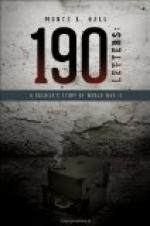It is by his close attention to the interior and spiritual significance of things that this painter is proved to be a poet, a religious poet who has sight, in this world, of the essence of being, in ineffable varieties: painter, and poet, and musician also, for in the trenches he lives with Beethoven, Handel, Schumann, Berlioz, carrying in his mind their imaginings and their rhythms, and conceiving also within himself ‘the loveliest symphonies fully orchestrated.’ Secret riches, intimate powers of consolation and of joy, able, in the gloomiest hours, in the dark and the mud of long nights on guard, to speak closely to the soul, or snatch it suddenly and swiftly to distances and heights. Schumann, Beethoven: between those two immortal spirits that made music for all human ears, and the harsh pedants, the angry protagonists of Germanism, who have succeeded in transforming a people into a war-machine, what likeness is there? Have we not made the genius of those two ours by understanding them as we understand them, and by so taking them into our hearts? Are they not friends of ours? Do they not walk with us in those blessed solitudes wherein our truest self awakens, and where our thoughts flow free?
It is the greatest of all whom a certain group of our soldiers invoke in those days before the expected battle in which some of them are to fall. They are in the depths of a dug-out. ’There, in complete darkness, night was awaited for the chance to get out. But once my fellow non-commissioned officers and I began humming the nine symphonies of Beethoven. I cannot tell what great thrill woke those notes within us.’
That almost sacred song, those heroic inspirations at such a moment—how do they not give the lie to German theories as to the limitations of French sensibility! And what poet of any other race than ours has ever looked upon Nature with more intimate eyes, with a heart more deeply moved, than his whose inner soul is here expressed?
* * * * *




